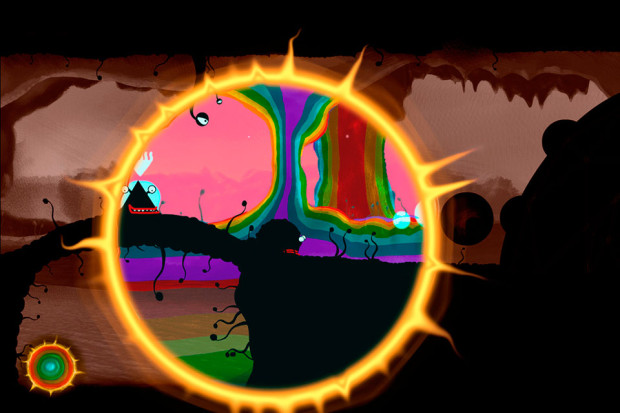In this week’s interview, we caught up with Alexander Kuvshinov, the art director, animator, and screenwriter at AuraLab. He’s the brain behind the wild landscapes and characters of point-n-click Karma.
Thanks for speaking with us today about your game, Karma. Incarnation 1. You’ve got an Indiegogo campaign running right now filled with images of exotic wildlife. For someone who has yet to see your work, how would you describe the game?
I would say that the game offers a meditative, psychedelic adventure filled with funny animations, subtle humour and just a tiny bit of irony. Or if you would, a surrealistic journey into the realms of good and evil, mixed with concepts of superpowers and survival.
The setting, the atmosphere, and the characters are really quite bizarre. Where did you get the inspiration for the concept?
Oh, inspiration comes from life itself! You see some kind of blot on the surface and immediately an image comes to mind, and you say to yourself – can I use this in game?
I was inspired by an animated series by Zumbakamera, Adventure Time, as well as games by Amanita Design. But generally, I’d say the world of Karma looks the way it is because I am good at drawing slime-like, gurgling, big-eyed creatures with bunch of tentacles, so that is what I do :)
[youtube link=”https://www.youtube.com/watch?v=o0mnq-ZJvao” width=”590″ height=”315″]
The point-n-click genre has always been a little “niche,” appealing to a very specific audience. What sets Karma apart from the others? Will you be aiming to attract veterans of the genre or people who haven’t played point-n-clicks before?
I think developing good games in this genre is quite complicated, as it takes takes a lot of time and effort, especially if you consider hand-drawn animation. You don’t really need as much perseverance in many other types of games. To create non-linear point-and-click adventure with two different worlds is four times as difficult, I would say. But I just love to draw and play games like Machinarium and Botanicula, so as you can imagine I was longing to create a game like this for quite some time now.
We’ve already tried to attract as many gamers as we can, quest-fans especially. We contacted some famous creators of adventures and hope to cooperate with them on the subject. We are glad Karma is well perceived by our favourite authors. For example, the guys from the Amanita Design already evaluated our game saying “Your game looks cool!” :)
From what I can understand of this karma system within the game, some scenarios will allow the player to pick either a “good” option or an “evil” option. How will choosing one over the other affect the player and/or the gameplay?
You can complete the majority of the quests in different ways, opening alternative plot-lines. For example, you can try to communicate with a character so he might give you a task to complete. Alternatively, you can just swallow the poor sod and get the item you need in a fast and efficient manner. Different choices lead to different paths, so naturally some scenes would change. Thus, re-playing the game is going to be just as fun as your first walkthrough.
Pip, the protagonist, doesn’t seem very worldly and definitely isn’t wise. Could you give us an example of a situation where the player will have to make a decision?
For example, you can save some nasty, malicious character when he gets in a sticky situation or let him die. Or you can simply eat someone who is smaller than you, and get the thing he owns, or do not eat it and get the item in any other way. All of this will affect the development of storylines. As everything in our life – at first you do bad things, then life turns its back on you – “butterfly effect”, so to speak :)
I saw a mention of surreal puzzles in the game’s description. One of the biggest talking points about point-n-clicks is the peculiarity (some would say arbitrariness) of solutions. What can we expect from these puzzles?
It’s actually pretty difficult to describe the puzzles we plan for this game in words.
We are trying to come up with original and unique puzzles and mini-games. You can look forward to things like reeling the tentacle around the pole in such a way that the eyes on the neighboring tentacle coincide together, for example.
There also will be musical puzzles, puzzles with gravity, attentiveness puzzles, etc.
Part of the gameplay is this mechanic called “astral sight.” What is it, and how will the players use it on their journey?
It is a special ability that Pip (the protagonist) eventually learns. With this ability, he can see beyond the physical world and gather hints and ideas from the subtle plane – the astral world. Pip can see thoughts and desires of other creatures, and this can help him solve puzzles and choose the right path. This ability can be upgraded with time, so it shows more and more previously hidden and unknown details.
This game certainly feels like the lovechild of some distinct ideas. What’s one thing you or your team are most proud of in or about Karma. Incarnation 1 ?
We love our “astral vision” idea. Generally, we strongly believe in laws of karma and the idea, that there are many ways to live your life, your every decision leads to certain results. And the is magical world behind the curtain, ready to guide you and give you even more fun – Pip can see it with his astral vision.
And of course, thanks again for the interview. We wish you the best of luck with your crowdfunding campaign!
Thanks guys, it was a pleasure to answer your questions!
